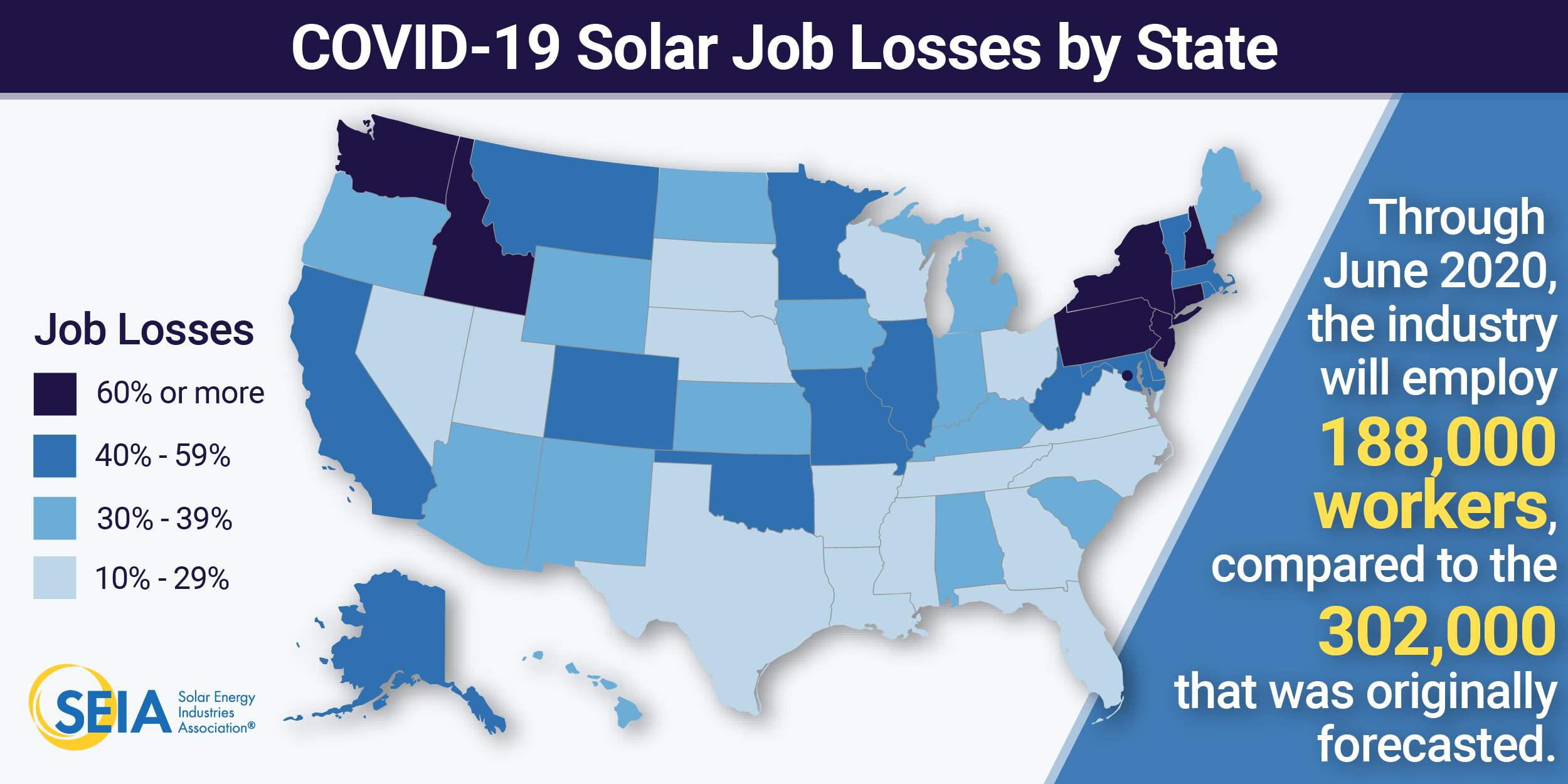How has the solar industry fared?
The United States saw record unemployment due to the pandemic-related lockdowns. As states slowly reopen, the economy is starting to recover but some industries are faring better than others. The solar industry has long been mired in unnecessary regulations and the subject of large lobbying forces. It was just beginning to overcome many of those obstacles as a major player in the energy markets when COVID-19 struck. How hard was the solar industry hit and how easily will it recover?
COVID-19’s Impact
SEIA (the Solar Energy Industries Association) estimates the United States is employing 114,000 fewer solar workers as of the beginning of June. This represents a 38% reduction in jobs compared to SEIA’s pre-pandemic estimates for the same timeframe. It also means the solar industry has been losing jobs faster than the rest of the economy. New York and New Jersey have seen losses of more than 60%.
Not surprisingly, solar installations are also suffering. There was a 37% reduction in solar installations in Q2 compared to SEIA’s previous estimates. This reduction is the equivalent of power needed for 288,000 homes and $3.2 billion in economic investment.
The energy efficiency industry was also hit particularly hard, with a nationwide loss of 70,000 jobs. This is due in part to economics and in part to health concerns surrounding construction in the home.
Virginia, which was ranked 10th in the country for clean energy jobs before the pandemic, has fared better than other states but has still suffered losses. The Commonwealth lost 2,015 solar jobs (14%) and has seen Q2 reduction in deployment of 68.40 MW (19%). Compared to the national downturn, Virginia has not been hit the hardest, but still needs to work diligently to get the industry back on track.
A Boost from the VCEA
A silver lining in this crisis is Virginia’s recent passage of the Clean Economy Act, which aims to phase out all fossil fuels by 2050. The VCEA’s primary driver is to support the market forces that will elevate solar and other renewable energy sources. Senator Jennifer McClellan and Delegate Rip Sullivan, patrons of the bill, say it is “expected to create up to 13,000 new jobs each year in the advanced energy industry.”
The new law sets out a number of incentives for consumers and developers and new requirements for utilities in Virginia. Specifically, in 2025, at least 75% of Dominion’s renewable energy must be generated from sources within the Commonwealth. Appalachian Power must procure 200 MW of renewable energy in the state by 2023. If these requirements remain in place, utilities will have to continue investing through the downturn.
Expanded incentives also make solar panel installation more attractive to Virginia consumers. Expansion of power purchase agreements and increased net-metering caps will decrease the cost of solar to consumers. Additionally, the establishment of a Renewable Portfolio Standard in Virginia will create a market for Renewable Energy Credits (RECs). A REC is a unit of renewable energy with a monetary value and can be sold by a consumer who also produces renewable energy. Solar RECs in Washington, D.C. are currently worth $400 each. Solar will also continue to reduce electricity costs which will be very important during this economic downturn.
Most importantly, the VCEA is indicating to the economy that there is legislative support for these efforts in Virginia, and developers of renewable energy should continue making investments.
What can you do to support the solar industry?
The solar industry was the fastest growing industry nationwide. Before COVID-19 it was on track to add 50,000 workers and invest $25 billion into the U.S. economy this year. Regardless of the important environmental and sustainability impacts of solar, it is a great investment to create jobs and stimulate our economy.
1. Federal: Support SEIA’s #RebuildBetter initiative. It is lobbying the federal government for programs to support solar businesses, including resuming the 30% federal tax credit on solar installations.
2. State: In the wake of COVID-19, the Governor and the Virginia General Assembly have been making changes and budget cuts. Call your delegate or senator to ensure the VCEA is still on track!
3. Local: Lobby your city, town, or county to take advantage of DMME’s SolSmart program, which is “a no-cost technical advisor program with support from The Solar Foundation to bring solar-specific resources and technical assistance to localities across Virginia.”
4. At Home: Consider panels for your own home! While they may seem like a significant investment, many programs have financing that will ensure you are immediately cash positive on your electric bill. Other financial opportunities include net-metering, RECs, the existing federal tax credit, and the increased value of your home on the real estate market.
